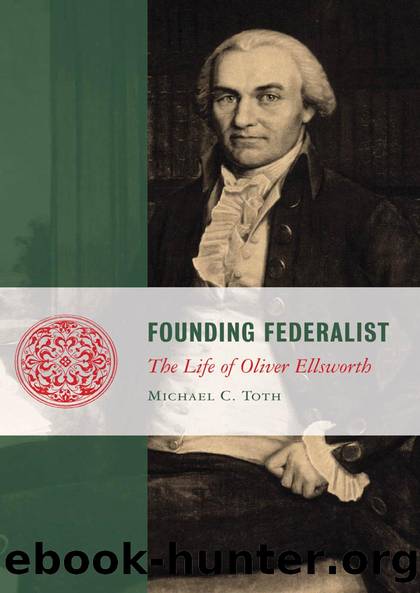Founding Federalist by Michael Toth

Author:Michael Toth [Toth, Michael]
Language: eng
Format: epub
Tags: Biography & Autobiography, Historical
ISBN: 9781497636309
Google: rVE6AwAAQBAJ
Publisher: Open Road Media
Published: 2014-04-08T02:43:04+00:00
CHAPTER FIVE
COURT-MAKER
In forming this branch, our objects areâa fair and open, a wise and impartial administration of justice, between the public and individuals, and between man and man.
ââFederal Farmer,â January 18, 1788
âA BILL FOR ORGANIZING THE JUDICIARYâ
Following the ratification of the Constitution, Oliver Ellsworth was selected by Connecticutâs legislature to serve in the inaugural class of the United States Senate. The new senator reported promptly to the federal capital in New York. âMost of the members from the Eastern States are arrived,â Ellsworth wrote Abigail after completing the three-day journey from Hartford, âbut not a sufficient number yet from the Southward to proceed to business.â Although the Senate lacked the necessary number of lawmakers to open its doors officially, Ellsworth was not content with sitting idle. Now forty-four, and seasoned from his multiple national and state posts, the Connecticut senator seemed focused. In the weeks that he waited for the Senate to open its chambers, Ellsworth readied himself for legislative action, pondering perhaps how he could seize from the outset a leading role in the new Senate. âI employ my time as I presume a numbers of others do,â he explained to Abigail, âin looking into & preparing for the business we are soon to enter upon.â1
When a quorum of lawmakers finally assembled in April 1789, the Senate appointed its first committee, which was tasked with compiling âa bill for organizing the Judiciary of the United States.â Because the proceedings of the First Senate were closed to the public, it is uncertain whether Ellsworth was responsible for pushing the creation of federal courts to the top of the chamberâs legislative agenda. However, it would be plausible if Ellsworth, a former state judge, prompted his colleagues to focus their attention first on establishing a national system of courts. The available records from the inaugural Senateâs proceedings and the correspondence of the senators do make clear that Ellsworth directed the enactment of the historic Judiciary Act of 1789. The bill, Ellsworthâs most significant legislative accomplishment during his seven years in the U.S. Senate, has the essential marks of the New Divinityâtrained Connecticut senatorâs consensus-driven moderate Federalism.
âTHE SORE PART OF THE CONSTITUTIONâ
In the summer of 1787, supporters of a stronger central government at the Constitutional Convention prevailed on a crucial point. The federal government, they convinced their fellow delegates, needed its own courts. The opposing point of view was expressed by John Rutledge early on in the proceedings when the influential South Carolina delegate declared that he was against âestablishing any national tribunal except a single supreme one.â Rutledge was immediately seconded by Roger Sherman of Connecticut, Ellsworthâs political mentor. According to James Madisonâs notes, Sherman, an eighteenth-century fiscal conservative, âdwelt chiefly on the supposed expensiveness of having a new set of Courts, when the existing State Courts would answer the same purpose.â2
The delegates, in short, had no trouble creating a Supreme Court, but they were split over the proper number of lower federal courts. As with other matters, the rival camps reached a compromise.
Download
This site does not store any files on its server. We only index and link to content provided by other sites. Please contact the content providers to delete copyright contents if any and email us, we'll remove relevant links or contents immediately.
| Afghan & Iraq Wars | American Civil War |
| American Revolution | Vietnam War |
| World War I | World War II |
Waking Up in Heaven: A True Story of Brokenness, Heaven, and Life Again by McVea Crystal & Tresniowski Alex(37025)
Empire of the Sikhs by Patwant Singh(22188)
We're Going to Need More Wine by Gabrielle Union(18089)
Hans Sturm: A Soldier's Odyssey on the Eastern Front by Gordon Williamson(16875)
Leonardo da Vinci by Walter Isaacson(11927)
The Radium Girls by Kate Moore(10928)
Educated by Tara Westover(7086)
Tools of Titans by Timothy Ferriss(6973)
How to Be a Bawse: A Guide to Conquering Life by Lilly Singh(6706)
The Last Black Unicorn by Tiffany Haddish(5085)
Permanent Record by Edward Snowden(5011)
The Rise and Fall of Senator Joe McCarthy by James Cross Giblin(4854)
Promise Me, Dad by Joe Biden(4461)
The Wind in My Hair by Masih Alinejad(4430)
The Crown by Robert Lacey(4120)
A Higher Loyalty: Truth, Lies, and Leadership by James Comey(4044)
The Iron Duke by The Iron Duke(3655)
Joan of Arc by Mary Gordon(3272)
How to be Champion: My Autobiography by Sarah Millican(3197)
